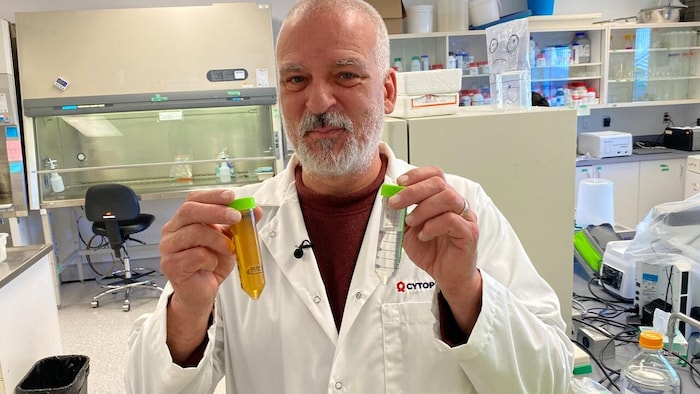Open in full screen mode Steven Theriault believes that bacteriophages are a response to antibiotic resistance, which, according to the World Health Organization (WHO), is one of the greatest threats to health, food security and development in the world, and which will be associated with nearly five million deaths in 2019. Radio-Canada Winnipeg scientist Steven Theriault is convinced he has the solution to antibiotic resistance: bacteria-killing viruses. However, he cannot get them approved by the Canadian regulatory system, which he says is rigid and outdated. The next one The big focus of science is genetics and living organisms, he said during a recent tour of his laboratory by CBC/Radio-Canada. I hope that in the future the Canadian government will change the regulatory process because it is something that will save lives in Canada and which will allow us to treat our herds of animals. And for the moment, we can't use it, he adds. A former ambulance driver, Steven Theriault holds a doctorate in molecular genetics and virology. For fifteen years, he worked on projects such as the Ebola vaccine at Canada's only Level 4 national microbiology laboratory in Winnipeg. He left his position in 2018 to create his own biotechnology company, Cytophage. Loading ELSEWHERE ON INFO: Israel-Hamas war: the last missing Canadian woman has died Her research focuses on bacteriophages, viruses that bind to bacteria and inject their genetic information into it, multiplying until they burst out of the bacteria, looking for other hosts to kill. Bacteriophages were discovered in 1915. They had been used to treat cholera during the 1927 epidemic, but were eclipsed by the appearance of antibiotics in the 1940s. Bacteriophages have come out of the shadows with the appearance of antibiotic-resistant bacteria. Steven Theriault and his team have genetically modified and designed bacteriophages that attack a range of bacteria. [Bacteriophages] do not infect human cells or animal cells, he specifies. And you probably have 100 trillion on you right now. Steven Theriault is not the only one to believe in the potential of bacteriophages. Research from the University of Toronto, the University of San Diego and the National Institutes of Health suggests that bacteriophage therapy has the potential to be used as a alternative or complement to antibiotic treatments in the era of drug-resistant pathogens.
Israel-Hamas war: the last missing Canadian woman has died
A model of bacteriophage.
The main cause of this resistance is the overuse of antibiotics in humans and animals, which kills some bacteria but allows others to mutate and develop defense mechanisms.
200% Deposit Bonus up to €3,000 180% First Deposit Bonus up to $20,000A growing number of infections, including pneumonia, tuberculosis, gonorrhea and salmonella, are becoming harder to treat as antibiotics are less effective against superbugs resistant.
By some estimates, 70% of all antibiotics used worldwide are used in animals. Until recently, regulations allowed Canadian producers to give antibiotics to livestock and poultry as a preventative measure. These antibiotics are found in groundwater and in animal meat.
After studying the use of bacteriophages in humans, Steven Theriault and his team quickly extended their work to the agricultural sphere.
They developed and tested a product called FarmPhage, a mixture of viruses that kills E. coli and salmonella bacteria in chickens. In trials conducted at the Vaccine and Infectious Disease Organization at the University of Saskatchewan, the survival rate of chickens infected with E. coli and having received the product was 92%, compared to 8% for untreated birds.
The team of scientists believe the product could also be suitable to treat people suffering from infections caused by drug-resistant superbugs.
Steven Theriault has submitted FarmPhage for approval in the United States and hopes to begin selling in that market in 2024. He is also interested in the European Union and Australia, which are currently developing their regulatory frameworks.
FarmPhage was, however, not submitted to Health Canada, because existing drug regulations are, according to Mr. Theriault, adapted to chemical drugs, and not to products such as bacteriophages, so it is impossible to meet all requirements.
This situation is also a concern for other Canadian biotechnology companies, according to Lauren Carde, vice-president of operations and regulatory affairs at Paul Dick and Associates, an animal health consulting firm based in Guelph, Ontario.
Our regulatory system is set up so that if you have a product that has an antimicrobial mode of action or that has therapeutic claims […] you enter the category of drugs, she explains.
Health Canada indicates that bacteriophages may be regulated specifically based on their use.
The organization says it works closely with other regulators, including in the United States, United Kingdom, New Zealand and Australia.
However, it is not aware of any approval for the use of bacteriophages for the prevention or treatment of any disease or disorder in animals in a trusted regulatory jurisdiction.
Over the past several years, Health Canada has worked with producer associations and veterinary groups to understand their needs for veterinary products and to jointly find innovative and flexible ways to introduce products into the Canadian market. indicates the declaration.
Health Canada specifies that it has not received any application for approval of FarmPhage or other bacteriophage product intended for animal use. p>
The FarmPhage product was added to the water of these chicks in Bangladesh in May 2023.
Given the pressure to reduce the use of antibiotics, Lauren Carde says Canada needs to change its rules to allow the use of bacteriophages as non-drug products.
There needs to be room for agility, flexibility and the role of catalyst for the introduction of these products, she says.
These technological advances are closely monitored by Canadian producers.
We're very familiar with the product and, in fact, we've helped Cytophage collect samples from farms and participated in testing, says Wayne Hiltz, executive director of the Manitoba Chicken Growers' Association.
Once the technology has been approved, I think there will be many possibilities for using this technology in our sector, believes- he.
With information from Karen Pauls

